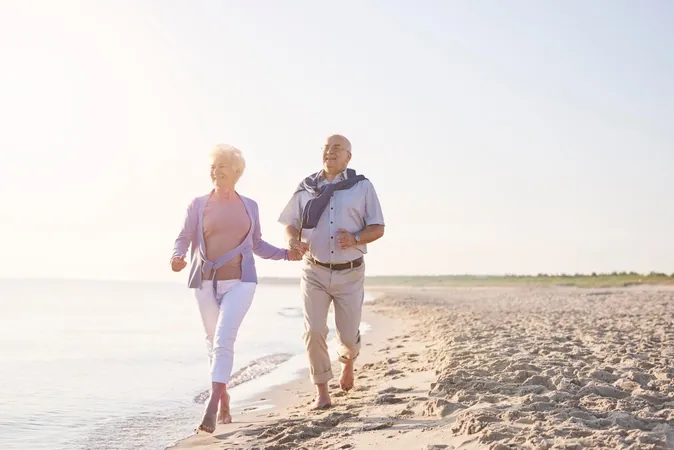
Unlocking the Secrets of Aging: How Inflammation Holds the Key to a Healthier Life
2025-09-16
Author: Michael
The Link Between Aging and Inflammation
Aging and inflammation are intricately connected, impacting our lives in profound ways. Recent scientific studies suggest that managing chronic inflammation, aptly named 'inflammaging,' could be the secret to healthier aging. For years, aging was perceived as a natural descent into decline; however, new research indicates that it might be more about maintaining a balance between our body's defense mechanisms and the forces that contribute to aging.
Understanding Inflammation: A Double-Edged Sword
Inflammation serves as the body's alarm system—essential for responding to injury and infection. In the short term, it’s a lifesaver, but when inflammation becomes chronic, it can damage healthy tissues and accelerate aging. Historically, strong inflammatory responses were beneficial in environments rife with danger. Fast forward to today, and modern lifestyles—filled with stress, poor diets, and inactivity—often lead to persistent inflammation, which is closely linked to age-related diseases.
The Science Behind Healthy Aging
Over the past decade, researchers have been exploring how reducing inflammation can enhance the health of older adults. A landmark study found that a drug that blocks a crucial inflammatory signal reduced the risk of heart attacks and even cancer. While results from various studies on different anti-inflammatory approaches have been mixed, they highlight the need to soothe inflammation without compromising our immune defense.
Lifestyle Changes: Your Best Defense Against Inflammaging
One of the most effective lifestyle changes is dietary modification. Consuming fewer calories while still eating a balanced diet has been shown to lower inflammatory markers in the body. Intermittent fasting, which involves taking breaks from eating throughout the day, mimics our ancestors' eating patterns and has been linked to reduced inflammation.
Physical activity also plays a critical role. While intense workouts might temporarily spike inflammation, regular moderate exercise—like walking, swimming, or cycling—has been consistently shown to reduce chronic inflammation, enhance vascular health, and promote the release of natural anti-inflammatory substances. This mirrors the active lifestyles of our ancestors.
Sleep and stress management shouldn't be overlooked! Quality sleep helps regulate inflammation, and techniques like meditation, yoga, and simply spending time outdoors can lower cortisol levels, which in turn helps control inflammation.
Innovative Therapies Targeting Inflammaging
As we look towards the future, groundbreaking biomedical research is unearthing novel therapies aimed at the root causes of inflammation. One promising area involves clearing out senescent cells—those that have stopped dividing but continue to secrete harmful inflammation-causing factors. Senolytic agents are showcasing potential in early trials to enhance health and reduce inflammation in older populations.
Another area of interest is our gut microbiome. The diverse bacteria in our digestive system significantly influence immune response. Imbalances here can lead to increased inflammation. New treatments, including probiotics and even microbiome transplants, are being explored to restore this balance and combat systemic inflammation.
Emerging therapies are focusing on specific pathways of inflammation at the molecular level, aiming to inhibit harmful signals while keeping our immune system intact. With advancements in precision medicine, more individualized treatment approaches for managing inflammation are on the horizon.
Rethinking Aging: A New Perspective on Health and Longevity
Viewing aging through an evolutionary lens sheds light on why these changes occur. Inflammation was originally intended to ensure survival long enough for reproduction. Now, in modern society where our lifespans have extended, these survival mechanisms can lead to chronic diseases.
This evolving outlook on aging allows us to take a proactive stance. While we can’t reverse aging, we can manage it more intelligently. The goal isn't immortality, but rather extending our 'healthspan'—the period of life filled with health and vitality. Even modest improvements in our health can significantly reduce age-related issues.
This newfound understanding of aging propels us toward a more optimistic outlook. Instead of viewing old age as a decline, we can see it as an opportunity for active engagement and healthy living. By merging lifestyle adjustments with cutting-edge therapies, we can empower more individuals to thrive in their later years and fully embrace life.









 Brasil (PT)
Brasil (PT)
 Canada (EN)
Canada (EN)
 Chile (ES)
Chile (ES)
 Česko (CS)
Česko (CS)
 대한민국 (KO)
대한민국 (KO)
 España (ES)
España (ES)
 France (FR)
France (FR)
 Hong Kong (EN)
Hong Kong (EN)
 Italia (IT)
Italia (IT)
 日本 (JA)
日本 (JA)
 Magyarország (HU)
Magyarország (HU)
 Norge (NO)
Norge (NO)
 Polska (PL)
Polska (PL)
 Schweiz (DE)
Schweiz (DE)
 Singapore (EN)
Singapore (EN)
 Sverige (SV)
Sverige (SV)
 Suomi (FI)
Suomi (FI)
 Türkiye (TR)
Türkiye (TR)
 الإمارات العربية المتحدة (AR)
الإمارات العربية المتحدة (AR)